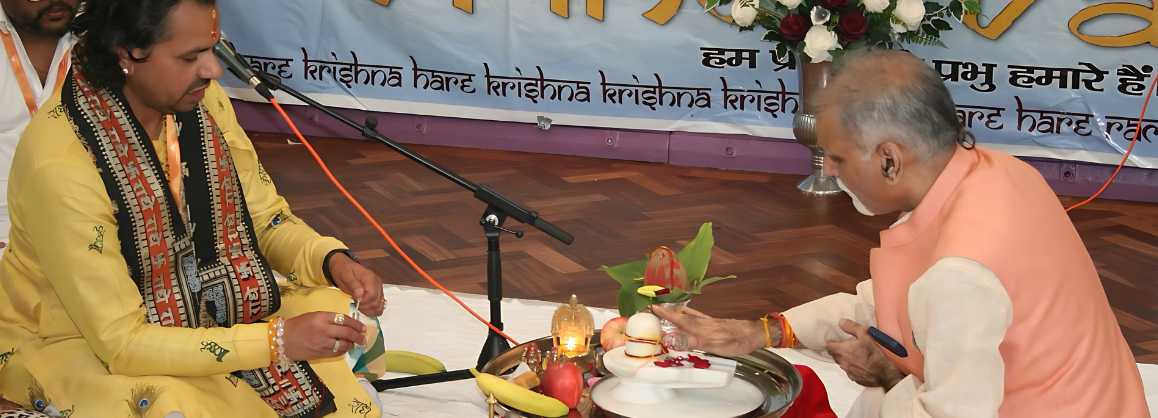Hindu Sacraments or Rites of Passage – Saṁskāras
Sacraments are “an outward visible sign of an inner spiritual grace.” For Hindus the Saṁskāras are a living, vibrant religious experience; moulding a person to become an ideal member of society by creating spiritual impressions in one’s mind and consciousness. The word Saṁskāra, derived from the Sanskrit root meaning “to refine” is used to represent education, refining, embellishment, purification plus much more. By means of the Saṁskāras, the consciousness is awakened and tuned towards the actual goal of life which is spiritual wisdom leading towards liberation from the cycle of birth and death.
Pre Natal Saṁskāras

- Garbha-dāna, known as Kṣetra Saṁskāra meaning it is only done in the case of the first pregnancy, is carried out in the consummation after marriage, with the most appropriate time being the 4th to the 16th night after menstruation.
- Pumsavana, also considered a Kṣetra Saṁskāra, is usually performed in the third month of pregnancy on a day which is ruled by a male Nakṣatra (asterism), for when the sex of the embryo is determined as a way to pray for the birth of a male child.
- Simantonnayana represents the parting of the hair, when women part their hair in the middle of the head, during the period between the fifth and eighth months of pregnancy, promoting no worries and cheerfulness.
- Vishnu-bali- Rite for the safe delivery of the child through the propitiation of Lord Vishnu the Supreme Lord.
Post Natal Saṁskāras

- Jāta-karma is the Saṁskāra of Birth, performed either before the umbilical cord is cut or in most cases on the 11th or 12th day after birth at the naming ceremony.
- Nāma-karaṇa the child is given a name usually chosen through the use of astrological calculation usually performed on the 11th, 12th or 16th days or on an auspicious date up to one year after the birth of the child.
- Anna-prāśana the child is weaned at the age of six months.
- Cauḷa is the Saṁskāra of Tonsure representing the first shaving of the head for longevity and protection.
- Karṇa-vedha Saṁskāra or the Piercing of the Ears, adorning the ears with gold to introduce and emphasise the first of the wisdom tools — listening.
- Vidyārambha or the learning of the alphabet
- Upanayanaṃ or coming close to the Guru, this involves the investiture of the sacred thread and initiation into vedic learning.
Saṃskāras at Death
The purpose of all ceremonies during, and after death are to assist and ease the deceased in their continued journey either towards emancipation or to a better re-birth so that continuous evolution may take place.
Reincarnation is the basis of Hinduism and death is not seen as an end but merely another stage.
Sarva PrāYaścitta
It is ideal for the person dying to be laid on a grass-mat or bed of eastward pointing darbha grass with the feet to the South. After Bhagavad arādhana and the giving of tīrtham, the chanting of the lord’s name should begin or the reciting of the Viṣṇu sahasranamam until demise.


Aurdhva Dehika Rites
After death the first thing that must be done is to wash and shave the corpse.Washing is usually done at the washing parlour, however family do have the option to do it. The final rites are either performed at the funeral palour, the home or the crematorium and the application of the rituals will differ accordingly. If performed at home, then the coffin is brought in head-first and laid with the feet to the South and is removed from the house feet first. Where the coffin is to be placed, till or mustard seeds are to be scattered.
Asthi Sañcayana/Nirvapana Vidhiḥ
This is done on the 3rd, 7th, or 9th day after the cremation where you return to the crematorium in order to collect the box of ashes.
Unnatural Death
Unnatural deaths such as drowning, accident, murder, suicide, or a death from a disease involving a lot of suffering, for example cancer or AIDS, Nārāyaṇa Bali, a special rite is performed. The Rite of Narayana Bali releases the victim from their continued and locked suffering.
Ritual Impurity
Ritual impurity (Aśaucaṃ) is the predisposition for the performance of an individual’s religious duties (dharma). Aśaucaṃ refers to a state of ritual unsuitability or ineligibility, where three main occasions can bring about this state; death, birth and menstruation.

